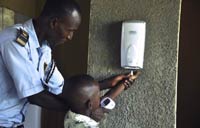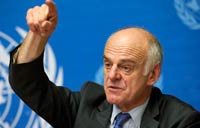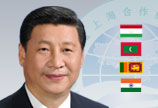Ebola epidemic could 'threaten world'
(Xinhua) Updated: 2014-09-26 11:04
 |
| Ebola could hit up to 1.4m West Africans |
 |
| UN chief appoints special envoy for Ebola, head of UNMEER |
He spoke at a show of solidarity with the West African nations in a conference room on the sidelines of the annual UN General Debate where others said the epidemic is worsening and threatens the world.
The event took place more than six months after Ebola broke out, killing more than 2,900 people in West Africa, according to the UN World Health Organization (WHO).
Pleas and promises for help were delivered after Ban opened the session with frank assessment of the situation.
"Despite the valiant efforts of local communities, health systems are buckling under the strain," he said, even as he paid tribute to the "workers on the frontlines," 300 of whom have died after exposure to the virus.
"Dozens of countries and organizations, too many to mention by name, are making life-saving contributions," Ban said. "But even these are falling significantly short of the 20-fold surge that is required."
"UN staff is eager to help," he said. "Within 24 hours of a call for staff to deploy, we received 4,000 applications. Some staff are preparing to depart over the weekend."
"This is a fast-moving epidemic that got ahead of everyone at the start and is still running ahead, jumping over everything we put in place to try to slow it down," said WHO Director-General Margaret Chan. "Every day, every minute, counts."
"We should expect things to get worse before getting better," she warned.
Calling Ebola "a horrific disease," President Barack Obama of the United States said it is "A potential threat to the world."
In the three countries hit by Ebola, "Economic growth is slowing dramatically," he said. If this epidemic is not stopped, this disease could cause a humanitarian catastrophe across the region. In an era when regional crises can quickly become global threats, stopping Ebola is in the interests of the entire world."
President Ernest Koroma of Sierra Leone, who spoke by tele- conference, echoed Obama's fear, in his prepared remarks, saying, "Ebola is not only a disease of Sierra Leone and its neighbors; it is a disease of the world."
"Globalization, increasing urbanization and denser networks of people rapidly moving between rural and urban areas and across borders is fuel for greater transmission of formerly isolated viral diseases," he said. "None of us recognized that this mix of trends could emerge with such force in West Africa. Our international partners were slow to recognize the threat for what it was."
Koroma believed banning of travel to and from Sierra Leone has hampered movement of needed supplies and personnel.
"We were gearing up our compromised health systems to fight the known ailments of our land like malaria and typhoid," he said. But when the epidemic hit, "the available national and international resources were grossly inadequate. Several months down the line, the international community is finally coming around to the better view that the Ebola Outbreak is a challenge for everyone."
Koroma called for "More treatment centers, labs and equipment; More clinicians, nurses and other health workers in treatment and holding centers; More training for national doctors, nurses and other health workers on safe and effective clinical and nutritional interventions; Lifting of blanket bans of flights to and from our countries; logistical support to improve response time, including Ebola customized ambulances, logistics experts, and information managers."
"The epidemic may be merciless, but love is trans-boundary," said Foreign Minister Wang Yi of China, "We have 1.3 billion people standing with you."
Chinese medical workers and millions of U.S. dollars had been dispatched or earmarked by Beijing to aid the three countries.
"Responding to further needs of the affected areas, China will continue to provide additional assistance by sending high level expert teams .. to share epidemic-control experience working with the international community to train medical personnel .. and promote setting up treatment centers," said Wang. "I am convinced that as long as the international community stands united in mind and action the Ebola epidemic will be defeated very soon."
Foreign Minister Bruno Rodriguez Parilla of Cuba, known for its health care and one of the first nations to respond with help for victims of Ebola, said, "coordination by the United Nations and the guiding role of the WHO are essential to ensure collective, coordinated and effective actions."
Such a massive effort is needed to save "a continent that has been historically disregarded and with serious social and underdevelopment problems, which enabled the outbreak and dissemination of the disease," he said.
Xanana Gusmao, prime minister of Timor-Leste, said, "The social and economic stresses threaten peace and stability, and are unraveling many hard fought development gains of recent years."
"We will provide 1 million U.S. dollars in an act of Fragile-to- Fragile and South-South cooperation," he said, adding the global response "must be twofold, urgently stopping the current outbreak and treating those affected."
"Then let us stand together to support the necessary long-term development efforts that will help build resilience to future outbreaks of disease or other shocks," Gusmao said. "This emergency serves as a stark reminder that all development shocks are amplified by existing vulnerabilities and weak institutions."
- Sierra Leone quarantines three more districts to stop Ebola
- China offers Ebola prevention materials to Benin
- US hospitals unprepared to handle Ebola waste
- Ebola could hit up to 1.4m West Africans
- Unproven Ebola drugs are put on the fast track
- UN chief appoints special envoy for Ebola, head of UNMEER
- UN team to combat Ebola arrives in West Africa










